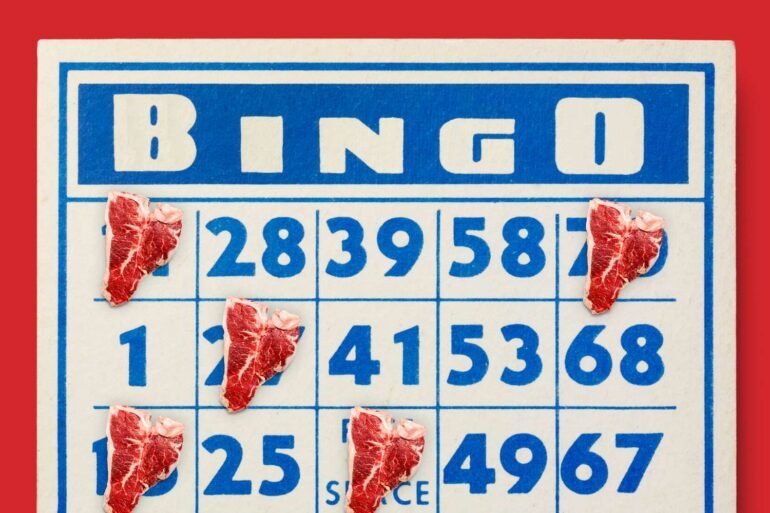:max_bytes(150000):strip_icc():format(jpeg)/Meat-Bingo-FT-DGTL0925-hero-2f5ac43e50044a3fb1244a9779d91ea2.jpg)
It’s the weekend in Minnesota’s Twin Cities: Minneapolis and St. Paul. Neighborhood dive bars are packed with people clutching tickets with great anticipation. What’s in their glasses is irrelevant. Those tickets (or, in some cases, bingo cards) are what truly matter.
If one of their tickets wins, they score a pack of meat. If they’re the first winner, they can score a thick steak or pork chops. If they win toward the end of the night, only burgers or sausages may remain. If they win multiple times, they may get serenaded with sarcastic chants of “meat hog” by their friends, which may well be everyone in the establishment.
Welcome to the world of meat raffles and meat bingo, Minnesota traditions since the aftermath of World War II. While the meat raffle’s origins trace to Wisconsin, one state over, Minnesota’s embrace of it makes it feel their own.
For those outside the Twin Cities, this regional ritual may seem weird. Yet, that weirdness can be what makes it irresistible to some once they visit or move here.
“I moved to Minnesota in 1995. When I heard about meat raffles, my first reaction was ‘What the hell is all this?’” says Virginia transplant Liz Schreiber. “It was all new to me, so I immediately had to check it out.”
It’s safe to assume that she liked what she saw. Schreiber spends her Sunday evenings hosting T-Bone Bingo at Grumpy’s, a cozy, chill neighborhood dive that’s graced northeastern Minneapolis since 1908.
“It gives people a great excuse to go to the bar on a Sunday,” she says. “It feels like one last hurrah before the weekend ends. Plus, they may win next Sunday’s dinner.”
“Liz is a force of nature,” says Pat Dwyer, Grumpy’s owner and operator. “She’s sassy as hell. Her co-host, Janna, is just as sassy. They make spending a Sunday afternoon here a good time.”
A meat raffle is a little more than just a good time, regardless of the host. It’s a glimpse into a regional bar culture built upon equal parts irreverence, acceptance, and kindness. It’s a vibe akin to a slap on the back and a gentle hug. Winning a rump roast is simply a bonus.
Courtesy of Grumpy’s Bar
The mechanics of meat raffles
A meat raffle’s mechanics are straightforward. People pay $1 per ticket (or bingo card, if the establishment does meat bingo), and sit through between 10 to 30 rounds. The host typically spins a wheel to determine the winner, which can lead to additional perks. “The winner wins two packs of meat, and the person to their left or the right wins a free drink whether they’re playing or not,” says Troy Olson, co-owner of The 1029 Bar in Minneapolis. “People like to win meat, but it’s fun to win a free drink, too.”
The lucky winner gets dibs on whatever meat is available. All kinds of cuts can be up for grabs: steaks, chops, burgers, sausages, bacon.
“We’ll also do seasonal meats on occasion,” says Meridith O’Toole, owner of The Spot Bar in St. Paul. “We’ll offer roasting meats in the fall since it’s pot roast season.”
Typically, bars get their raffle meat from local butchers or independent grocery stores, and the money raised goes to various community programs like a rec center, a youth sports team, or a community club like the local Elk’s Lodge. If the meat runs out, the hosts will switch to gift cards. “People prefer fresh meats to the gift cards,” says O’Toole.
Each bar has their own cadre of meat raffle or meat bingo regulars. They are not without their quirks. “People will get mad if they show up and someone’s sitting in ‘their’ seat,” says Olson, with a chuckle. “The next week, they’ll show up 30 minutes earlier just to make sure they get their seat.”
Courtesy of Dusty’s Bar
A delicious way to gamble
Meat raffles are a funky branch of a larger practice in Twin Cities dive bar culture called “charitable gambling.” This concept, overseen by the Minnesota State Gambling Board, allows bars to offer games of chance to patrons for a small fee, usually $1 or $2 per chance, as long as all of the proceeds go to a local community-based charity. Keeping any proceeds from meat raffles is strictly prohibited.
The most prominent gaming option is pull-tabs, which are perforated paper cards adorned with symbols that essentially function like lottery scratchers. Pull-tabs and other games like traditional bingo offer cash prizes. Meat raffles and meat bingos offer, well, meat.
It’s fun for participants. From a legal standpoint, it’s serious business. “All meat raffles for charitable gambling must be regulated by the state governing board,” says Tim Bohmer, who hosts a meat raffle at Dusty’s Bar in Northeast Minneapolis every Friday night. “If ‘Billy Bob’s Bar’ down the street is running a meat raffle without this government regulation, the government can come in and shut down the game immediately for illegal gambling.”
Such regulations don’t apply to Grumpy’s T-Bone Bingo because it’s free to anyone who wants to play. Dwyer moved away from charging for tickets in part because of his discomfort about gambling in bars. He also noticed that younger customers weren’t into the bingo’s gambling element, something he feels may impact the future of meat raffles.
“It feels like charitable gambling may be a disappearing element of bar culture,” he says. “For some people, it’s almost becoming like smoking in bars.”
Courtesy of Dusty’s Bar
More than meat
The chance to win meat at the neighborhood bar provides the foundation for these events. But there are other factors, such as the genteel nature of the patrons and that it gives people something to do during the dark, cold winter months.
But there’s something a little deeper at play. Twin Cities dive bars represent the “third space” ethos at its zenith. The participants amplify “Minnesota nice,” where the regulars know every nook and cranny of everyone else’s lives. They embrace newcomers as one of their own within minutes, regardless of age, race, gender, or economic status.
For out-of-towners, these venues can leave an indelible mark that make them yearn for a return trip. It’s just about impossible to replicate a Twin Cities dive bar’s vibe elsewhere.
Even if Twin Cities dive bars are unicorns, could the core objective of a meat raffle — winning meat — thrive outside the region?
“I could see it happening in a place that has a lot of snowbirds, like Florida or Arizona,” says Bohmer.
O’Toole also thinks meat raffles could work elsewhere, but it would depend on the venue. “I don’t see this working at a high-end cocktail bar,” she says. “They’d likely do it as a joke.”
Even if meat raffles and meat bingos crop in non-traditional regions, it’s highly unlikely they’ll match the Twin Cities’ energy. It’s worth experiencing at least once. Its warmth easily transcends Minnesota’s cold.
Rich Manning
2025-09-24 13:00:00

